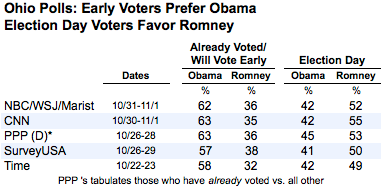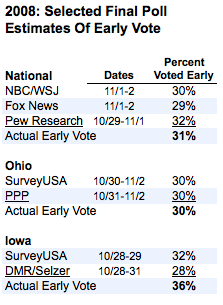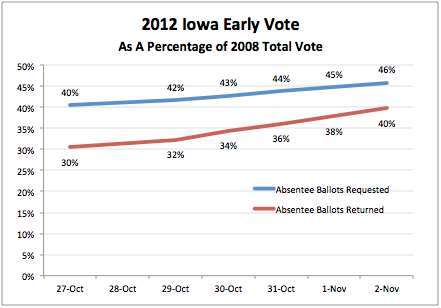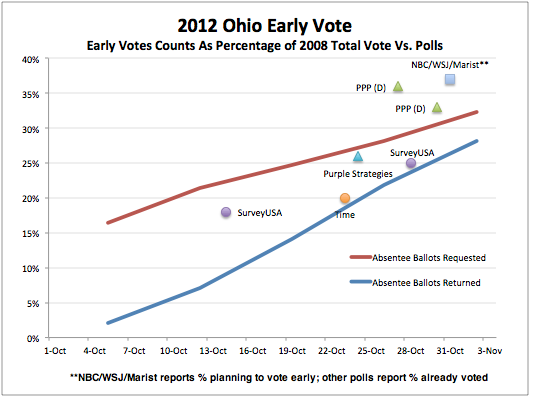
WASHINGTON -- With polls continuing to show President Barack Obama holding small but significant leads over Republican challenger Mitt Romney in several critical battleground states, speculation is building over whether the polls will be accurate.
One persistent line of argument involves the challenge to pollsters in measuring the early and absentee vote, which is likely to exceed the 41 million votes cast in 2008. While this challenge is real and some pollsters may miss the true early vote share, evidence of a looming polling "disaster" on this issue is tenuous at best.
As issue is the continuing Obama advantage in the early vote cast in many of the most contested battleground states. In Ohio, for example, five different surveys conducted in recent weeks show Obama with leads over Romney of 18 points or better among those who have voted or plan to vote early, while Romney leads by smaller margins among those who say they plan to vote on Election Day.

Some Obama supporters have worried that pollsters might somehow exclude the early voters, but a HuffPost review shows that most pollsters are providing early voters with a path into their surveys, by asking direct questions to measure the number voting early.
The full text of questions gathered in the HuffPost review appears at the end of this article.
But the more serious concern is the possibility that the record levels of early voting in the battleground states, combined with intensive efforts by both campaigns to get their supporters to vote early, are making it too easy for "unenthusiastic Democrats" -- who may not vote at all -- to be classified as likely voters.
Pollsters have long understood that many Americans tend to overstate their voting behavior, not wanting to admit to a stranger on the phone that they are not planning to vote. For this reason, pollsters employ a variety of methods to try to dial back self-reported vote intent. The worry, as TPM's Josh Marshall put it, is that pollsters are automatically treating each self-identified early voter "as certain voter, a likely-plus, as it were."
While some pollsters do exactly that, many more have taken different approaches in order to make sure that early voters are not overstated as a percentage of the electorate. Organizations such as ABC News/Washington Post and Democracy Corps wait for voters to volunteer that they plan to vote early when asked if they plan to vote -- they do not prompt them with a specific question. Others like Pew Research, Quinnipiac University/CBS/New York Times, SurveyUSA and JZ Analytics probe for early voting as part of their vote-intent questions, which offer other answer options that would provide an easier "out" for the truly unenthusiastic voter, such as saying they will "possibly not vote" or are "not sure yet."
The Marist/NBC News/Wall Street Journal polling partnership, has been the object of some of the harshest criticism for its early voting estimates. One reason may be that they ask a simple, yes/no question to identify those who plan to vote early: "Thinking about November's presidential election, do you plan to vote early or by absentee, vote on Election Day, or have you not decided?"
What the critics miss is that Marist does not give early voters any special "automatic" early voting status. "We do not screen," explains Marist's Barbara Carvalho via email. Instead, they use a probabilistic model -- much like the one used by the CBS News/New York Times poll -- that weights likely voters up and unlikely voters down based on their self-reported chance of voting, interest in the campaign and past voting history.
But despite the variety of approaches, a spot check of results from polls conducted four year ago shows that pollsters were generally successful in predicting the size of the early vote. The early and absentee totals shown by surveys conducted over the final weekend of the 2008 campaign were very close to the final totals, except in Iowa where they were roughly 6 percentage points too low.

The slight 2008 understatement in Iowa is instructive. The reason may be that Iowa allows registered voters to request absentee ballots by mail until the Friday before the election, and many voters return their ballots over the final weekend. As a result, the numbers that say they have "already voted" on a poll conducted four to five days before the election miss a significant chunk of ballots cast or returned late.
Just this week, for example, data provided by the Iowa Secretary of State shows that 83,577 new absentee ballots were requested. As of Friday, the number of returned absentee ballots in Iowa was 40 percent of the total vote cast in the state 2008. The latest Des Moines Register Iowa poll conducted earlier this week by Selzer & Company reported that 42 percent of Iowa's likely voters had already voted early. Given that some pollsters expect turnout to be slightly lower this year, the Register poll's estimate of the early vote already cast appears to be about right.

The number of ballot requests in Iowa as of Friday afternoon was 46 percent of the 2008 turnout. That number is important, because according to the U.S. Election Assistance Commission, 95 percent of Iowans that requested absentee ballots submitted them for counting in 2008. So assuming the same return rate, the number of ballot requests as of Friday would produce an early vote in 2012 that is 44 percent of the 2008 total vote.
When last week's NBC/Wall Street Journal/Marist poll in Iowa found 45 percent of registered voters and 52 percent of likely voters reporting that they planned to vote early, some critics howled about a polling "disaster." But with in-person early voting set to continue in Iowa through Monday, and given that a slightly lower total vote would increase the early vote percentage, the Marist estimate may turn out to be about right.
The reported early vote numbers in Ohio are roughly consistent with some but not all polls, though again there is room for error since we do not know how large the final turnout will be.
Most of the poll estimates of the percentage of likely voters that have "already voted" in Ohio fall within a plausible range of those who have actually voted and the larger number that have voted or requested ballots (both calculated as a percentage of the total votes in 2008). Some respondents may be telling pollsters that they voted, thinking of a ballot sitting on a kitchen table ready to be mailed. The ballots of other respondents may have been sent, but are not yet processed.
The most recent NBC/Wall Street Journal/Marist poll is the only one on the chart to report the percentage who say they "plan to" vote early (37 percent) in Ohio. That number is bigger than the most recent tally of those that have either already voted or have requested ballots (32 percent), if calculated as a percentage of the total 2008 vote. Once again, however, another few days of early voting still remain,s and the actual percentages of early voters may be larger if the total 2012 turnout falls off from 2008.

The red line showing the percentage of ballots cast or requested is the better estimate of those intending to vote early. In 2008, again according to the U.S. Election Assistance Commission, 98 percent of the Ohio voters that requested absentee ballots ultimately returned and submitted them for counting. If the turnout this year is lower than in 2008, then the early vote will be a slightly larger percentage of the vote than indicated in the chart.
Yes, the continuing trend toward early voting is forcing pollsters to alter their procedures, and some may miss the mark in 2012. But evidence of a consistent, systematic bias in the polls as a result of this issue is tenuous at best.
*********
The compilation of early vote questions combines information published by the pollsters or furnished on request to The Huffington Post.
National Polls
(ASKED OF REGISTERED VOTERS) I'd like you to rate the chances that you will vote in the presidential election in November: Are you absolutely certain to vote, will you probably vote, are the chances 50-50, or less than that?
Interviewers record those who volunteer that they have "already voted."
(IF CERTAIN TO VOTE) Do you think you'll (vote in person at your polling place on Election Day), or (vote before Election Day by early voting or mail-in ballot)?
Interviewers record those who volunteer that they have "already voted."
Have you already voted in the upcoming November general election by going to an early voting location, or by mailing in an early voting or absentee ballot, or not?
On November 6th, the Presidential election will be held. Using a 0-to-10 scale, where 10 means you are completely certain you WILL VOTE and 0 means you are completely certain you will NOT vote, how likely are you to vote in the upcoming Presidential election? You can use any number between 0 and 10, to indicate how strongly you feel about your likelihood to vote.
Interviewers record those who volunteer that they have "already voted."
[If not already identified as an early voter] Do you plan to vote before election day, or will you vote on election day? [IF BEFORE ELECTION DAY: Will you vote early by mail or early in person?]
What are the chances of your voting in the election for President and Congress in November: are you almost certain to vote, will you probably vote, are the chances 50-50, or don't you think you will vote?
(IF ALREADY VOTED) When you voted by absentee ballot or through early voting, did you vote by mail or in person?
Democracy Corps: "It is Democracy Corps' standard on national surveys to not explicitly ask whether respondents have already voted, but rather have them volunteer it."
[IF PLAN TO VOTE, ASK]: Which of the following applies to you:
-You have already voted in this year's election, either by absentee ballot or early voting opportunities in your state,
-You plan to vote before Election Day, either by absentee ballot or early voting opportunities in your state, or
-You plan to vote on Election Day itself
Gallup: "Respondents who report they already voted are treated as likely voters"
[IF REGISTERED VOTER] What is the likelihood of your voting in the elections to be held this November -- are you extremely likely, very likely, somewhat likely, not very likely at all to vote or have you already voted?
Have you already voted in the upcoming November general election by going to an early voting location, or by mailing in an early voting or absentee ballot, or not?
And do you plan to vote at an early voting location or by mailing in an early voting or absentee ballot?
-Yes -- I plan to vote at an early voting location
-Yes -- I plan to mail in an early voting ballot
-Yes -- I plan to mail in an absentee ballot
-No -- I do not plan to vote early
How likely are you to vote in the presidential election this year?
-I already voted
-Definitely
-Very likely
-Somewhat likely (DISQUALIFY end)
-Not likely (DISQUALIFY end)
(ASKED OF 417 VOTERS LIVING IN STATES WHERE EARLY VOTING HAS ALREADY STARTED) Some people we have spoken with have already filled out their ballot for the Federal election for President, Senate, Congress and statewide offices being held next month -- Have you already cast your ballot in the election by voting by mail or in person at an early polling location? (DO NOT READ CHOICES:) (IF NOT YET VOTED, THEN ASK:) And do you plan to vote early -- either by mail or in person -- or will you vote at the polls on Election Day?
In the election for President next month, have you already voted, are you certain to vote, likely to vote, are you not sure, or are you unlikely to vote?
Do you plan to vote in the presidential election, have you ALREADY voted, or don't you plan to vote? IF VOTED EARLY Did you vote in person or did you mail in your ballot?
Pollsters Active In Ohio & Iowa
Columbus Dispatch Mail Poll
Have you already voted in this year's election?
-Yes I mailed in my absentee ballot
-Yes, I voted early in person at the elections board or voting center
-No, but I still plan to vote before Election Day
-No, I plan to vote at the polls on Election Day
Thinking about November's presidential election, do you plan to vote early or by absentee, vote on Election Day, or have you not decided?
Additional comments from Marist Institute: First, we do not screen. We use a probability model based on chance of vote, interest, and past vote.Second, the question [above] measures those who "plan to vote early" but have said they haven't done so yet. They are defined as likely depending on their probability of voting as determined by above questions.
Third, at the tossup [vote choice question], respondents could indicate they had already voted. These "already voted" respondents are included with likely voters.
Have you already voted, either at an early voting site or with an absentee ballot?
Have you already voted, either through absentee ballot or early voting?
Most people do not vote in every election. How likely is it that you will vote in the Presidential election in November -- have you already voted, would you say you will definitely vote, probably vote, possibly not vote, or definitely not vote?
Rasmussen Reports CEO Scott Rasmussen: "We ask if they've voted."
How likely is it you will vote in the November general election for president and other offices -- will you definitely vote, probably vote, might or might not vote, probably not vote, or have you already voted?
In the November 6 election for President, have you already voted? Will you vote before Election Day? Will you vote on Election Day? Will you not vote? Or are you not yet sure?
SurveyUSA President Jay Leve: There is a bifurcation at the top of SurveyUSA election research. Those registered voters who tell SurveyUSA they have "already voted" are given a separate battery of "who did you vote for" questions, all asked in the past tense. Those who tell SurveyUSA they will vote but have not yet done so, first receive another filtering question, which, if they pass, are then given a battery of "vote" questions in the conditional tense, as in: "in an election today, who would you vote for?"
As you know, there will be a presidential election this November. At this point, would you say you'll definitely not vote in the presidential election, probably not vote, may or may not vote depending upon how you feel at the time, probably vote, or definitely vote in the presidential election or have you already voted?
WeAskAmerica COO Gregg Durham: In qualifying voters as "likely voters" after early voting begins, we typically ask them whether: "you've already voted early, plan to vote early, or plan to vote on Election Day." In areas where we have voter files, we compare their answers to what we think "likely" voters should be (we're continuing to find that INTENT to vote can be closely correlated with those who actually DO vote, but voter files are needed to be sure).
CNN/ORC
"Respondents who reported that they had already cast an absentee ballot or voted early were automatically classified as likely voters."
Early vote question not published.

